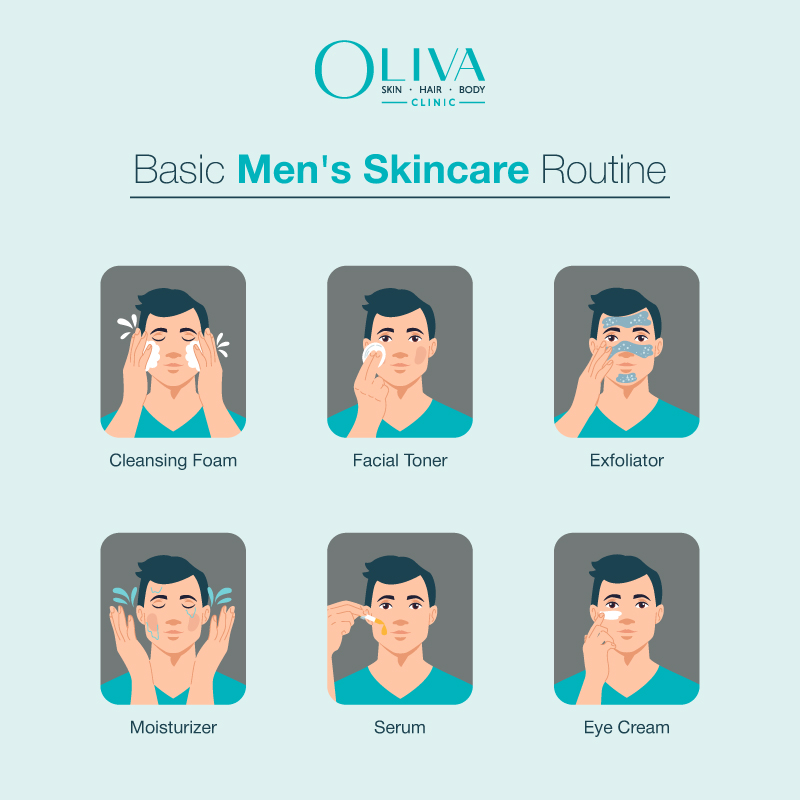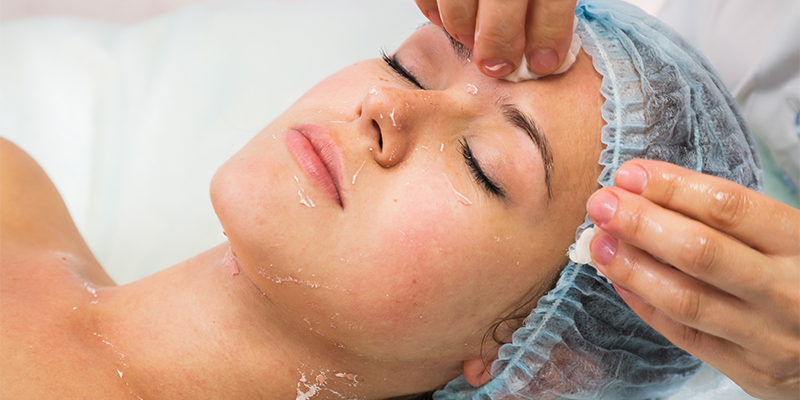In This Article
A Men’s Skincare Routine for All Skin Types
It can feel intimidating to start a skincare routine from scratch for men. It’s never too late to start or build on if you have a routine. Skincare is an investment not only for better skin and youthful appearance but also for health and self-confidence. It may feel like a map impossible to decode, but start by building habits because they’re good for you. A straightforward skincare routine is recommended to keep things simple. This beginner-friendly guide is easy to follow if you are starting and unsure of your skin type.
In This Article

What is a Skin Care Routine?
A routine is a series of steps. The term “Skin Care Routine” was coined by the industry and has been increasingly used to emphasise the importance of skincare. For instance, in the shower, you usually do everything in the same order – shampoo, conditioner, and body wash. You may also be in the habit of brushing your teeth before you wash. It becomes a routine since you follow this out of habit without putting in extra thought or effort. Including the fewest products when developing a routine that takes the least time possible is recommended. You have no reservations about what product you’re using and what it’s doing.
What Type of Skin Do I Have?
If you understand your skin type, you can take the right step toward a targeted approach. Skin type means defining a group of binding characteristics that reflect how your skin looks and feels. Your skin type primarily depends on the sebum production of your skin. Majorly, this is the result of genetics. However, several other factors can influence it—including ageing, stress, humidity and hormones. Over time, you may find that your skin type changes based on how much oil the skin produces or age or specific environments. Identifying your skin type, whether oily, normal, dry, sensitive or a combination, can help you develop the right skincare routine.
Best Skin Care Routine Based On Types Of Skin:
Each skin type has its own features and requires different care based on every skin type:
1.Oily Skin:
- Oily skin is due to excess sebum production from the sebaceous glands of the skin. Excessive sebum causes your face to feel greasy and appear shiny, especially throughout the T-zone, which is made of the forehead, nose, and chin. Oily skin tends to be prone to blackheads, large pores, and blemishes.
Features:
- Excess sebum production
- Shiny T-zone
- Large pores
- Acne blemishes
Skincare routine:
- Wash your face twice daily with an exfoliating cleanser.
- Apply a toner containing glycolic acid, salicylic acid, or lactic acid.
- Moisturise with an oil-free, water-based, lightweight moisturiser.
- Apply SPF 30 sunscreen before stepping out.
- Always do a patch test before use.
2.Normal Skin
- Normal skin implies your skin feels comfortable and hydrated, not oily or dry. People with normal skin type do not have oily or dry patches. Normal skin types are not usually prone to any particular skin concerns. People with normal skin type have a smooth skin texture and may be less prone to sensitivity.
Features:
- Well-balanced skin
- Minimal pores
- Balanced hydration level
Skincare routine:
- Cleanse with a gentle cleanser twice a day.
- Apply a light moisturiser.
- Always wear SPF 30 sunscreen or higher.
- Avoid oil-based moisturisers and alcohol-based products.
- Always do a patch test.
3.Combination Skin:
- Combination skin means that some areas of your face are dry and others are oily. The T-zone is commonly oily, and the cheeks are often drier. People may notice shine in areas with more oil, while others may feel red patches in drier spots. The combination skin type may vary during different seasons of the year.
Features:
- Mix of skin types
- Both dry and oily patches
- Skin differs between the T-zone and cheeks
Skincare routine:
- Cleanse your face with a gentle cleanser to prevent buildup.
- Apply a toner to balance pH levels and get rid of excess oil.
- Use a hyaluronic acid serum.
- Use cream-based lotions for dry parts and a lightweight formula for oily areas.
- Apply at least SPF 30 sunscreen.
4.Sensitive Skin:
- Sensitive skin is determined by how reactive it is than other skin types. Certain ingredients and environmental factors may easily trigger this skin type, which is extra vulnerable to external irritants. People with sensitive skin may feel that it stings, burns, or feels irritated and notice their skin looks red after applying skincare products.
Features:
- Feels itchy, dry, and burning
- Vulnerable to external irritants
Skincare routine:
- Wash twice daily with a gentle cleanser. Choose a cleanser formulated with hydrating ingredients like ceramides and hyaluronic acid.
- Use an alcohol-free toner after cleansing and reduce redness.
- Choose a non-comedogenic, fragrance-free, and hypoallergenic moisturiser.
- Look for zinc oxide-based formula sunscreen with SPF 30.
- Choose a face mask formulated for sensitive skin with chamomile, colloidal oatmeal, aloe or other ingredients that soothe irritation and reduce redness.
- Always do a patch test before including anything in your skincare routine.
- Skip long, hot showers to prevent irritation.
5.Dry Skin:
- Dry skin produces less sebum compared to other skin types. Without sufficient natural oils, the skin may lose moisture and appear dehydrated, flaky, dull, and even scaly. It often feels tight, with more visible fine lines. Dry skin type tends to be itchy or irritated.
Features:
- Dull, rough and flakey
- Prone to fine lines
Skincare routine:
- Cleanse with a hydrating cleanser.
- Use an alcohol-free toner to balance the pH levels.
- Use a serum with hyaluronic acid.
- Moisturise with a non-clogging formula.
- Protect your skin with an SPF 30 or higher sunscreen.
- Choose lightweight, non-oil-based products.
- Avoid over-exfoliating.
- Avoid products with ingredients like benzoyl peroxide, alcohol and fragrances.
Must Read: Daily Skin Care Routine For Glowing Skin
Why Is Skincare Important For Men?
Skincare for men is often overlooked or dismissed, overshadowed by stereotypes that associate self-care with femininity. The lack of a range of products in the market for men is also a contributing factor to less awareness of its importance. Let’s learn reasons why skincare for men is essential:
- Important to maintain overall skin hydration.
- Helps to put up a primary defence against irritants or environmental stressors
- Preserves skin in its healthy, fresh and young form.
- Keeps breakouts and adverse reactions at bay.
Why Men’s Skin Care Is Different From Women’s?
Skin Thickness: Men’s skin is thicker than women’s, which slows its ability to maintain moisture. Therefore, their skin usually requires different products.
Shaving: Daily shaving exposes immature, more sensitive skin by removing the outer layer of skin cells.
Pore Size and Oiliness: Men’s skin usually has large pores, causing excess sebum secretion. This results in breakouts and blemishes.
Signs of Ageing: Men usually show the signs of ageing later than women. However, the changes are rapid once they start.
Things to Avoid for Better Skin
- Avoid prolonged, unprotected sun exposure.
- Quit alcohol or consume it in moderation to avoid dehydration and inflammation.
- Smoking damages the skin and accelerates ageing. It is advisable to quit the habit.
- Lack of sleep affects the skin repair process.
- Avoid overeating processed food, sugar, and junk food.
Takeaway
Being consistent is crucial to achieving healthy, radiant skin. However, stress, hormonal imbalances, and inadequate nutrients can make the process more challenging. Unlike women, society has yet to realise the importance of skincare for men. There are long-term benefits to having a consistent skincare routine ideal for your skin type. It is best to consult an experienced dermatologist if your skincare routine isn’t giving you optimal results.
Frequently Asked Questions
Follow a simple CTM routine – cleansing, toning, and moisturising daily.
Be consistent with your skincare routine, stay hydrated, and avoid sun exposure and smoking. Eat a balanced diet and regular exercise for long-term results.
It delays signs of ageing, reduces acne, and improves skin health.
Yes. Morning products generally focus on protection, while night products address repair concerns.
Yes. A moisturizer is important to keep skin hydrated and protected from dryness.
You may notice visible signs of improvement in 4 to 6 weeks with consistent use. It depends on the extent of concern and skin type.








